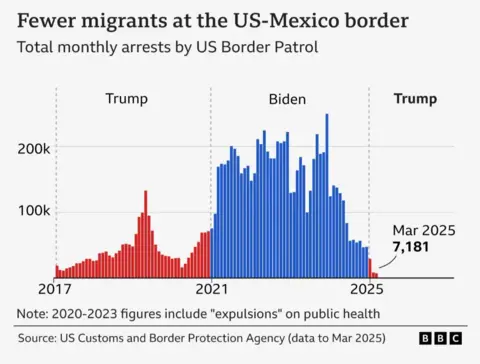Donald Trump recently marked the 100th day of his second term in office with a speech that echoed the fervor of his campaign style, during which he celebrated various achievements while also attacking his political opponents. This public address took place in Michigan, specifically in a suburb of Detroit, where he engaged a crowd of supporters by emphasizing what he referred to as a “revolution of common sense,” suggesting that his presidency was fundamentally about delivering “profound change” to the American landscape.
In his remarks, Trump didn’t shy away from mocking his predecessor, Joe Biden, while simultaneously directing his criticism towards the U.S. Federal Reserve Chairman, Jerome Powell. He dismissed the validity of polls indicating a decline in his popularity, insisting that such data was “fake.” The speech also highlighted a key accomplishment of his administration in immigration policy—the significant drop in illegal crossings at the U.S. southern border—although it’s worth noting that his economic strategies could pose political vulnerabilities as he engages in what many are calling a global trade war.
Trump’s promise to his supporters was clear: “We’ve just gotten started, you haven’t seen anything yet.” This forward-looking declaration was reinforced by remarks regarding the manufacturing sector in the Midwest, claiming that automobile companies were “lining up” to establish new plants, thereby underlining his administration’s focus on revitalizing the American economy. However, Trump also faced scrutiny as he signaled a softening of his hardline stance on tariffs affecting foreign automobiles and car parts, responding to industry concerns about potential price increases.
In the midst of his celebratory rhetoric, Trump conducted an informal poll during the speech, asking attendees for their preferred nicknames for Biden and playfully deriding the mental sharpness of his Democratic opponent. Moreover, he continued to assert, without providing evidence, that he was the rightful victor of the 2020 presidential election, a narrative that resonates with his core supporters.
The back-and-forth between Trump and his critics was palpable, particularly as the Democratic National Committee (DNC) characterized these first 100 days of Trump’s second term as a “colossal failure.” They attributed rising costs of living and an encroaching “Trump recession” to his policies, underscoring the contentious political climate surrounding his administration.
Polling data from Gallup delivered a sobering perspective to Trump’s claims of support. He is the only U.S. president since World War II to have recorded an approval rating below 50% after the first 100 days, currently standing at around 44%. Notably, however, Republican voters continue to express steadfast support for Trump, despite broader criticisms of the administration from other political circles.
Trump’s administration has touted a notable decrease in immigration encounters at the southern border—reported figures plummeting from over 140,000 to just over 7,000. His efforts in this area have faced legal challenges, particularly related to his attempts to redefine citizenship rights for those born on U.S. soil. During the speech, he displayed a video highlighting deportees being exported to a major prison facility in El Salvador, emphasizing his hardline approach to immigration control.
However, some of his claims were met with skepticism; for instance, he asserted an 87% drop in egg prices, a statement contradicted by recent government data. While there has been a decrease in inflation, energy prices, and mortgage rates since the start of his term, an uptick in unemployment and a downturn in consumer sentiment suggest that challenges remain.
Reactions to Trump’s policies vary across the public spectrum. Joe DeMonaco, a Michigan business owner, expressed disappointment with the fluctuating import taxes leading to increased prices, which he felt might be detrimental to his customers. Conversely, other supporters, like Teresa Breckinridge from Georgia, viewed Trump’s leadership favorably, believing that his actions would ultimately benefit the economy and reinforce their loyalty to him.
Overall, the first 100 days of Trump’s second term present a complex picture that balances grandiose assertions of success with significant political and economic challenges, reflective of the current state of U.S. governance and society. As the administration moves forward, the interplay between Trump’s policies and public sentiment will remain critical in shaping the political narrative.



